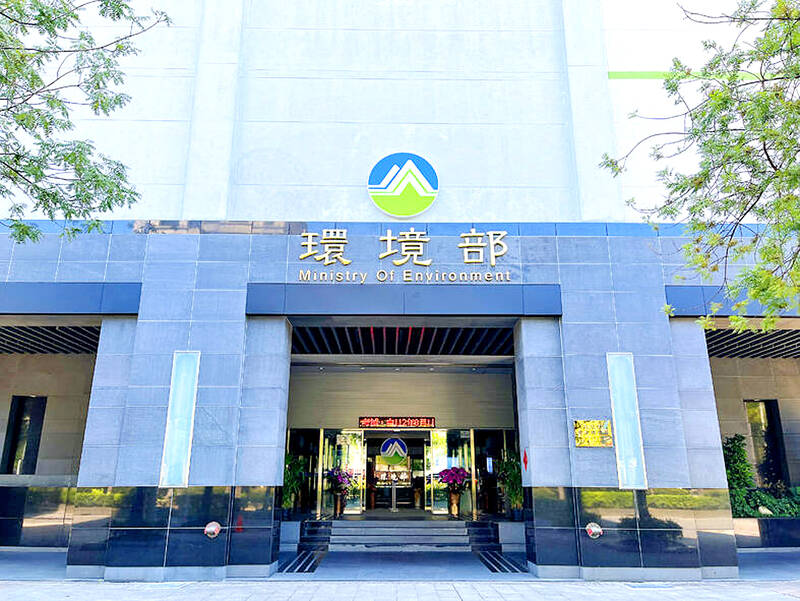The Ministry of Environment on Thursday released a set of guidelines for corporations to declare carbon neutrality in a bid to discourage “greenwashing,” but no penalties were included for noncompliance.
The guidelines encourage corporations to use its definition in declaring carbon neutrality for their products, services or organizations “to avoid circumstances under which they could make false declarations or mislead the public without revealing adequate information,” the ministry said.
“We have seen products, or even events such as marathons, claiming to have achieved carbon neutrality, but if the corporations have a distorted definition of the term, or consumers have little understanding of it, then that declaration becomes pointless,” Deputy Minister of Environment Shih Wen-chen (施文真) said.

Photo: Chen Chia-yi, Taipei Times
The new guidelines aim to avoid “greenwashing,” which the World Economic Forum (WEF) says takes the form of “selective disclosure” or “symbolic actions,” a ministry official told a news conference in Taipei.
The WEF defines “selective disclosure” as advertising positive environmental aspects of a product while hiding the negative factors, while “symbolic actions” refer to a focus on attention-grabbing activities, such as purchasing carbon credits, while failing to take substantial action to cut emissions.
The ministry said that its guidelines, which were compiled based on international standards such as the ISO14068-1 and the Greenhouse Gas Protocol, have three main stages that need to be followed for a product or service to be considered carbon neutral.
First, companies must perform a complete calculation of their carbon emissions, or the products and services for which they want to declare carbon neutrality, the ministry said.
Corporations should then publicly state its science-based decarbonization pathway and how much carbon they reduced, with verification from an independent certification agency, it said.
In the third stage, which can only be undertaken after the first two are completed, accredited carbon credits would be used to offset emissions, it said.
The ministry would not take any initiatives to examine products or services that corporations claim to be carbon neutral, nor would it provide certification, Shih said.
“For now, compliance with the guidelines is voluntary, as our aim is mainly education and advocacy,” she said. “Public discussion would be needed if the guidelines are to be made compulsory.”
As such, no penalties would be imposed for failure to follow the guidelines, but consumers can report “false or misleading advertising” to the Fair Trade Commission, which would assess the case based on the ministry’s guidelines, she said.

Taiwan has received more than US$70 million in royalties as of the end of last year from developing the F-16V jet as countries worldwide purchase or upgrade to this popular model, government and military officials said on Saturday. Taiwan funded the development of the F-16V jet and ended up the sole investor as other countries withdrew from the program. Now the F-16V is increasingly popular and countries must pay Taiwan a percentage in royalties when they purchase new F-16V aircraft or upgrade older F-16 models. The next five years are expected to be the peak for these royalties, with Taiwan potentially earning

STAY IN YOUR LANE: As the US and Israel attack Iran, the ministry has warned China not to overstep by including Taiwanese citizens in its evacuation orders The Ministry of Foreign Affairs (MOFA) yesterday rebuked a statement by China’s embassy in Israel that it would evacuate Taiwanese holders of Chinese travel documents from Israel amid the latter’s escalating conflict with Iran. Tensions have risen across the Middle East in the wake of US and Israeli airstrikes on Iran beginning Saturday. China subsequently issued an evacuation notice for its citizens. In a news release, the Chinese embassy in Israel said holders of “Taiwan compatriot permits (台胞證)” issued to Taiwanese nationals by Chinese authorities for travel to China — could register for evacuation to Egypt. In Taipei, the ministry yesterday said Taiwan

‘LIKE-MINDED PARTNER’: Tako van Popta said it would be inappropriate to delay signing the deal with Taiwan because of China, adding he would promote the issue Canadian senators have stressed Taiwan’s importance for international trade and expressed enthusiasm for ensuring the Taiwan-Canada trade cooperation framework agreement is implemented this year. Representative to Canada Harry Tseng (曾厚仁) in an interview with the Central News Agency (CNA) said he was increasingly uneasy about Ottawa’s delays in signing the agreement, especially as Ottawa has warmed toward Beijing. There are “no negotiations left. Not only [is it] initialed, we have three versions of the text ready: English, French and Mandarin,” Tseng said. “That tells you how close we are to the final signature.” Tseng said that he hoped Canadian Prime Minister Mark Carney

POSITIVE DEVELOPMENT: Japan and the US are expected to hold in-depth discussions on Taiwan-related issues during the meeting next month, Japanese sources said The holding of a Japan-US leaders’ meeting ahead of US President Donald Trump’s visit to China is positive news for Taiwan, former Japan-Taiwan Exchange Association representative Hiroyasu Izumi said yesterday. After the Liberal Democratic Party’s landslide victory in Japan’s House of Representatives election, Japanese Prime Minister Sanae Takaichi is scheduled to visit the US next month, where she is to meet with Trump ahead of the US president’s planned visit to China from March 31 to April 2 for a meeting with Chinese President Xi Jinping (習近平). Japan and the US are expected to hold in-depth discussions on Taiwan-related issues during the